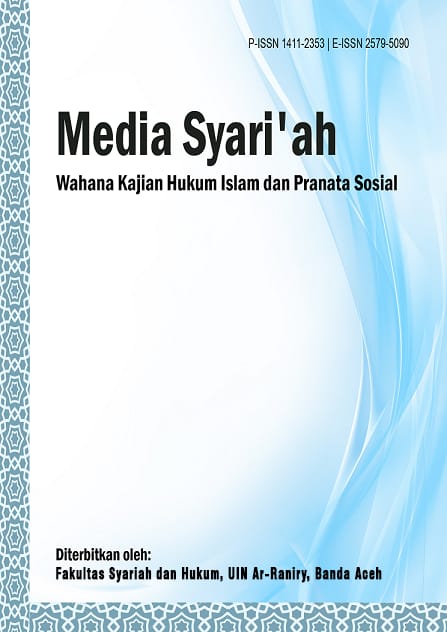Pengawasan Internal Perspektif Maqāṣid Al-Syarīʻah (Analisis Peraturan Pemerintah No. 60 Tahun 2008 tentang Sistem Pengendalian Intern Pemerintah)
DOI:
https://doi.org/10.22373/jms.v20i2.6518Keywords:
Pengawasan Internal, Maqāṣid Al SyarīʻahAbstract
Abstrak: Tujuan penelitian adalah untuk mengetahui bagaimana perspektif maqāṣid al-syarīʻah terhadap pengawasan internal yang terkandung dalam Peraturan Pemerintah No. 60 Tahun 2008 tentang Sistem Pengendalian Intern Pemerintah. Penelitian dilakukan dengan metode penelitian kepustakaan dengan pendekatan yuridis-normatif yang dipadukan dengan pendekatan maqāṣidī. Hasil penelitian menunjukkan bahwa pengawasan internal secara maqāṣid al-syarīʻah, dianggap sebagai bagian dari al-maṣlaḥah al-ḥājjiyyah, dan berfungsi sebagai wasā‟il (sarana). Pengawasan internal merupakan sarana untuk memudahkan penyelenggaraan pelayanan publik supaya dapat berjalan sesuai dengan aturan yang telah Allah tetapkan. Pengawasan internal merupakan bagian dari pemeliharaan agama dan harta dalam wujud pelaksanaan amar makruf nahi mungkar dan pertanggung jawaban terhadap amanah serta pemeliharaan atas harta umum (public fund). Sehingga dapat disimpulkan bahwa secara umum konsep pengawasan internal yang diamanahkan dalam Peraturan Pemerintah tersebut telah sesuai dengan apa yang diinginkan oleh syarak, hanya saja masih harus dilakukan penyempurnaan pada sistem pengawasannya agar apa yang diinginkan oleh syarak dapat terimplementasi dengan baik.
Abstract: The aim of the research is to find out how the perspective of maqāṣid al-syarīʻah towards internal supervision contained in Government Regulation No. 60 of 2008 About the Government Internal Control System. The study was conducted with a literature research method with a juridical-normative approach combined with the maqāṣidī approach. The results showed that internal supervision by maqāṣid al-syarīʻah, was considered as part of al-maṣlaḥah al-jiājjiyyah, and functioned as wasā'il (means). Internal supervision is a means to facilitate the implementation of public services so that they can run according to the rules that God has set. Internal supervision is part of the maintenance of religion and assets in the form of the implementation of amar makruf nahi mungkar and accountability for the mandate and maintenance of public assets (public funds). So it can be concluded that in general the concept of internal supervision mandated in the Government Regulation is in accordance with what is desired by the sharak, only that improvements must be made to its monitoring system so that what is desired by the sharak can be implemented properly.
References
Ahmad, J. bin. (2006). Jaribah bin Ahmad, Fikih Ekonomi Umar bin Al-Khathab (terj. Asmuni Solihan Zamakhsyari). Khalifa.
Al-Fairuzabadi, M. B. Y. (n.d.). Al-Qamus Al-Muhith. Maktabah An-Nuri.
Al-Mawardi, I. (2006). Al-Ahkam As-Sulthaniyyah: Hukum-Hukum Penyelenggaraan Negara Dalam Islam. Darul Falah.
Al-Yūbī, M. S. ibn A. ibn M. (1998). Maqāsid al-Syari’ah al-Islāmiyyah. Dār al-Hijrah.
Bakri, A. J. (1996). Konsep maqashid syari’ah menurut al Syatibi. Raja Grafindo Persada.
Dahlan Tamrin. (2007). Filsafat Hukum Islam. UIN Malang Press.
Djazuli, A. (2007). Fiqh Siyasah: Implementasi Kemaslahatan Umat Dalam Rambu-Rambu Syariah. Kencana.
Fathoni, A. (2009). Organisasi dan Manajemen Sumber Daya Manusia. Rineka Cipta.
Gil Courtemanche. (1986). New Internal Audit. John Wiley & Sons.
Hamka. (2007). Tafsir Al-Quran, Jilid 4. Pustaka Nasional.
Haris Herdiansyah. (2012). Metode Penelitian Kualitatif Untuk Ilmu-Ilmu Sosial. Salemba Humanika.
Henry Faizal Noor. (2008). Ekonomi Manajerial. Raja Grafindo Persada.
Humas BPKP Riau. (n.d.). Urgensi Kapabilitas APIP dalam Mengawal Kinerja Pemerintah.
M. Manulang. (1996). Dasar-dasar Manajemen. Ghalia Indonesia.
Menteri Ini Kritik Independensi Auditor Intern Pemerintah. (n.d.). Retrieved June 12, 2014, from https://finance.detik.com/read/2014/06/12/125801/2606229/4/menteri-ini-kritik-independensi-auditor-intern-pemerintah
Muhammad, F. (1989). Alwan, Al-Qiyam al-Ḍaruriyyah wa Maqāṣid al-Tasyrī‟ al-Islāmī. al Hay‟āh al-Miṣriyyah.
Quthb Ibrahim Muhammad. (2002). Kebijakan Ekonomi Umar Bin Khattab. Pustaka Azzam.
Republik Indonesia, Peraturan Pemerintah No. 60/2008 Tentang Sistem Pengendalian Internal Pemerintah, Lembaran Negara Republik Indonesia Tahun 2008 Nomor 127.
Sinn, A. I. A. (2013). Manajemen Syariah: Sebuah Kajian Historis Dan Kontemporer. PT Raja Grafindo Persada.
Syahatah, H. H. (2005). Perlindungan Aset Publik dalam Perspektif Hukum Islam. Amzah.
Tjandra, W. R. (2008). Hukum Administrasi Negara. Universitas Atma Jaya Yogyakarta.
Wahbah Az Zuhaili. (2013). Tafsir Al Munir jilid 2. Gema Insani Press.
Zein, M. M. (2013). Menguasai Ilmu Ushul Fiqh: Apa dan Bagaimana Hukum Islam Disarikan dari Sumber-sumbernya. Pustaka Pesantren.
Downloads
Published
Issue
Section
License
MEDIA SYARI'AH: Wahana Kajian Hukum Islam dan Pranata Sosial has CC-BY-SA or an equivalent license as the optimal license for the publication, distribution, use, and reuse of scholarly work. Authors who publish with this journal agree to the following terms:
1. Authors retain copyright and grant the journal right of first publication with the work simultaneously licensed under a Creative Commons Attribution-ShareAlike 4.0 International License that allows others to share the work with an acknowledgment of the work's authorship and initial publication in this journal.
2. Authors are able to enter into separate, additional contractual arrangements for the non-exclusive distribution of the journal's published version of the work (e.g., post it to an institutional repository or publish it in a book), with an acknowledgment of its initial publication in this journal.
3. Authors are permitted and encouraged to post their work online (e.g., in institutional repositories or on their website) prior to and during the submission process, as it can lead to productive exchanges, as well as earlier and greater citation of published work (See The Effect of Open Access).
You are free to:
Share — copy and redistribute the material in any medium or format.
Adapt — remix, transform, and build upon the material for any purpose, even commercially.
The licensor cannot revoke these freedoms as long as you follow the license terms.
All papers published in MEDIA SYARI'AH: Wahana Kajian Hukum Islam dan Pranata Sosial are licensed under a Creative Commons Attribution-ShareAlike 4.0 International License.




.png)


.png)
.png)
.png)



